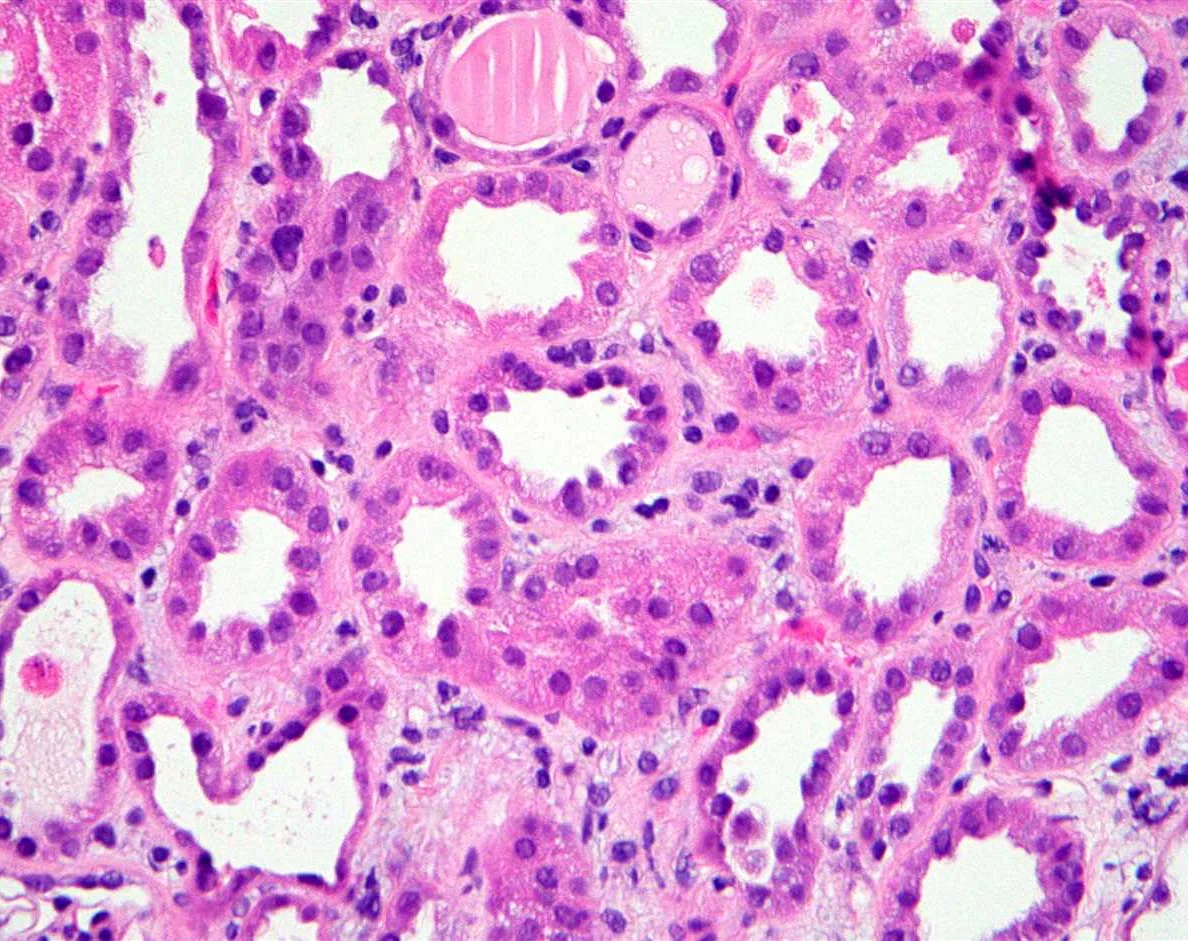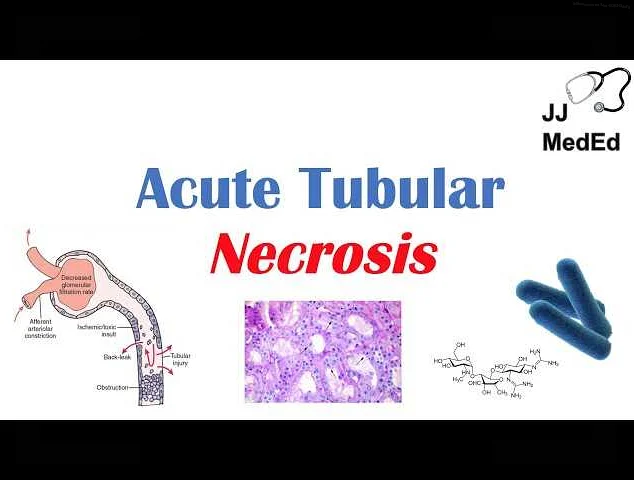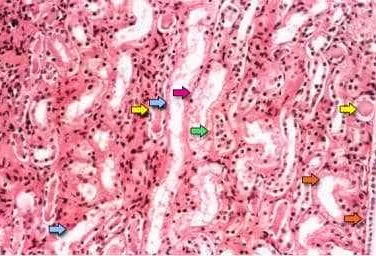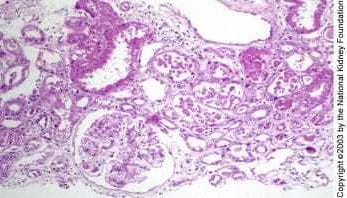Acute Tubular Necrosis (ATN): Causes, Symptoms, and Treatment
Acute tubular necrosis (ATN) is a condition that occurs when there is damage to the tubular cells of the kidneys. It is commonly caused by decreased blood flow to the kidneys, toxins, or certain medications. Symptoms may include decreased urine output, fluid retention, and electrolyte imbalances. Treatment typically involves addressing the underlying cause and providing supportive care to help the kidneys recover.
Acute Tubular Necrosis (ATN) is a serious medical condition that affects the kidneys. It occurs when the tubular cells in the kidneys become damaged and are unable to properly filter waste products from the blood. This can lead to a buildup of toxins and waste materials in the body, which can cause a range of symptoms and complications.
There are several potential causes of ATN, including severe dehydration, low blood pressure, and exposure to certain medications or toxins. In some cases, ATN can also result from medical procedures or surgeries that affect the blood flow to the kidneys. Understanding the underlying cause of ATN is crucial for determining the most effective treatment approach.
The symptoms of ATN can vary depending on the severity of the condition, but common signs may include decreased urine output, fluid retention, nausea, vomiting, fatigue, and confusion. In severe cases, ATN can lead to kidney failure, which may require dialysis or a kidney transplant to manage.
Treatment for ATN aims to address the underlying cause and support kidney function. This may involve intravenous fluids to maintain hydration, medications to manage blood pressure and electrolyte imbalances, and avoiding further exposure to substances that can damage the kidneys. In some cases, dialysis may be necessary to help remove waste products from the blood and support kidney function while they heal.
In conclusion, Acute Tubular Necrosis (ATN) is a serious kidney condition that can have severe complications if left untreated. Understanding the causes, symptoms, and treatment options for ATN is essential for early detection and effective management of this condition.
What is Acute Tubular Necrosis (ATN)
Acute Tubular Necrosis (ATN) is a medical condition that affects the kidneys, specifically the tubules, which are responsible for filtering waste products from the blood and producing urine. ATN is characterized by the death and damage of these tubular cells.
ATN can be caused by a variety of factors, including decreased blood flow to the kidneys, toxic substances, or certain medical conditions. When the kidneys do not receive enough blood, they cannot function properly, leading to cell death and damage in the tubules.
Common causes of decreased blood flow to the kidneys include hypovolemia (low blood volume), hypotension (low blood pressure), sepsis (a severe infection), or complications during surgery. Toxic substances, such as certain medications or chemicals, can also cause ATN when they are not properly excreted by the kidneys.
Symptoms of ATN can vary depending on the severity of the condition, but may include decreased urine output, fluid retention, fatigue, confusion, and electrolyte imbalances. If left untreated, ATN can lead to chronic kidney disease or kidney failure.
Treatment for ATN typically focuses on addressing the underlying cause and providing supportive care to the kidneys. This may involve treating any infections, restoring proper blood flow to the kidneys, and managing electrolyte imbalances.
If you suspect you or someone you know may have ATN, it is important to seek medical attention for an accurate diagnosis and appropriate treatment. Early detection and intervention can help prevent further kidney damage and improve outcomes.
Causes of Acute Tubular Necrosis (ATN)

Acute Tubular Necrosis (ATN) can be caused by various factors that damage the renal tubules, leading to cell death and dysfunction. Some common causes of ATN include:
1. Ischemic ATN: This type of ATN occurs when there is a decrease in blood flow to the kidneys, resulting in insufficient oxygen and nutrients reaching the renal tubules. Ischemic ATN can be caused by conditions like severe dehydration, low blood pressure, and shock.
2. Nephrotoxic ATN: Certain medications, chemicals, and toxins can directly damage the renal tubules, leading to ATN. Common nephrotoxic substances include nonsteroidal anti-inflammatory drugs (NSAIDs), antibiotics (such as aminoglycosides), contrast dyes used in imaging tests, and certain chemotherapy drugs.
3. Sepsis: Severe infections, particularly those that spread throughout the body (sepsis), can cause ATN. The toxins released by bacteria or fungi can damage the renal tubules and impair kidney function.
4. Kidney obstruction: Blockages in the urinary tract, such as kidney stones, tumors, or enlarged prostate, can cause ATN. The obstruction prevents urine from flowing properly, leading to backflow and buildup of waste products in the renal tubules.
5. Other causes: ATN can also result from conditions like acute glomerulonephritis, systemic lupus erythematosus (SLE), rhabdomyolysis (muscle breakdown), and certain autoimmune diseases.
It’s important to identify the underlying cause of ATN to determine the appropriate treatment and prevent further damage to the kidneys. Prompt medical intervention and management of the underlying cause can help improve outcomes for patients with ATN.
Symptoms of Acute Tubular Necrosis (ATN)

The symptoms of acute tubular necrosis (ATN) can vary depending on the severity and extent of kidney damage. Some common symptoms include:
- Decreased or absent urine output
- Fluid retention and swelling in the extremities
- Decreased appetite and weight loss
- Nausea and vomiting
- Fatigue and weakness
- Confusion and difficulty concentrating
- Shortness of breath
- High blood pressure
- Irregular heartbeat
In severe cases of ATN, patients may develop symptoms of acute kidney injury (AKI), such as uremia, which is the buildup of waste products in the blood. Uremia can cause symptoms such as nausea, vomiting, muscle cramps, and seizures.
If you experience any of these symptoms, it is important to seek medical attention as soon as possible for proper diagnosis and treatment.
Diagnosis of Acute Tubular Necrosis (ATN)

The diagnosis of Acute Tubular Necrosis (ATN) typically involves a combination of medical history, physical examination, and laboratory tests. It is crucial to identify the underlying cause of ATN in order to provide appropriate treatment and prevent further kidney damage.
During the medical history assessment, the healthcare provider will inquire about symptoms, past medical conditions, medications, and any recent exposure to potentially nephrotoxic substances. The physical examination may reveal signs of fluid overload, such as edema or high blood pressure.
Laboratory tests play a crucial role in diagnosing ATN. The following tests are commonly performed:
| Blood tests | These tests measure the levels of creatinine and blood urea nitrogen (BUN) in the blood. Elevated levels indicate impaired kidney function. |
| Urinalysis | A urinalysis helps evaluate the urine’s physical and chemical properties. It can detect the presence of red and white blood cells, protein, and casts. |
| Kidney biopsy | In some cases, a kidney biopsy may be necessary to confirm the diagnosis of ATN and assess the extent of kidney damage. This procedure involves taking a small sample of kidney tissue for analysis. |
Imaging studies, such as ultrasound or CT scans, may also be performed to evaluate the size and structure of the kidneys and assess for any blockages or abnormalities.
Once a diagnosis of ATN is confirmed, the underlying cause should be addressed. This may involve discontinuing medications that are causing kidney damage, treating infections, managing electrolyte imbalances, and providing supportive care.
In conclusion, the diagnosis of Acute Tubular Necrosis (ATN) involves a comprehensive evaluation of medical history, physical examination, laboratory tests, and imaging studies. Early diagnosis and intervention are crucial for effectively managing ATN and preventing further kidney damage.
Treatment for Acute Tubular Necrosis (ATN)

The treatment for acute tubular necrosis (ATN) focuses on managing symptoms, providing supportive care, and addressing the underlying cause of the condition. This may involve a combination of medical interventions and lifestyle changes.
1. Fluid Replacement: One of the primary goals of treatment is to maintain proper fluid balance in the body. Intravenous fluids may be administered to ensure adequate hydration and prevent dehydration.
2. Electrolyte Management: Imbalances in electrolyte levels can occur in ATN. Doctors may monitor and correct the levels of electrolytes such as sodium, potassium, and calcium through medication and dietary adjustments.
3. Diuretics: Diuretics may be prescribed to promote urine production and eliminate excess fluid and wastes from the body. This can help reduce edema and improve kidney function.
4. Dialysis: In severe cases of ATN where kidney function is significantly impaired, dialysis may be necessary. Hemodialysis or peritoneal dialysis can help remove waste products and excess fluids from the blood.
5. Treating Underlying Causes: ATN can have various underlying causes, such as infections, medications, or blocked urine flow. Addressing and treating these underlying causes is crucial for managing ATN effectively.
6. Medications: Depending on the specific circumstances, medications may be prescribed to treat complications or manage symptoms associated with ATN. This may include antibiotics to treat infections or medications to control high blood pressure.
7. Nutritional Support: A balanced diet tailored to the individual’s needs may be recommended to support overall health and aid in the recovery of kidney function. This may involve reducing sodium intake, increasing protein intake, and avoiding certain foods and beverages that can further damage the kidneys.
8. Follow-up Care: Regular follow-up visits with healthcare professionals are essential for monitoring kidney function and adjusting treatment plans. Routine blood tests, urine tests, and imaging studies may be conducted to assess the progress and make necessary modifications to the treatment regimen.
It is crucial for individuals with ATN to follow their healthcare provider’s recommendations and maintain a healthy lifestyle to support kidney function and overall well-being.